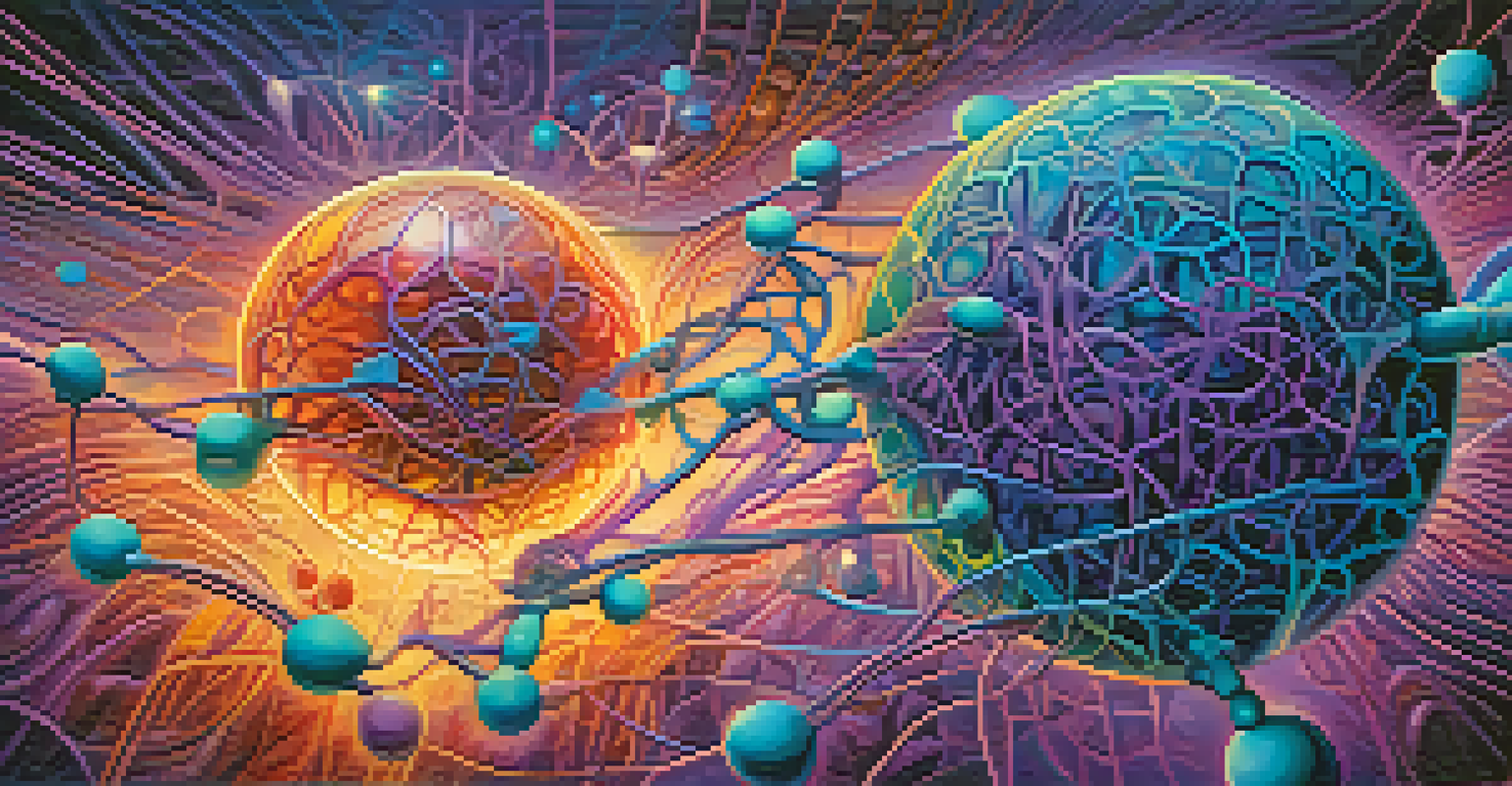Understanding the Role of Serotonin in Hallucinogenic Experiences

What is Serotonin and Its Functions in the Brain?
Serotonin is a neurotransmitter that plays a crucial role in mood regulation, sleep, and appetite. Often dubbed the 'feel-good' chemical, it contributes to feelings of well-being and happiness. It acts as a messenger between nerve cells, influencing various biological processes and ensuring our brain functions smoothly.
The mind is everything. What you think you become.
Beyond mood enhancement, serotonin is involved in cognitive functions such as memory and learning. This is particularly relevant when discussing its role in hallucinogenic experiences, as altered states of consciousness often hinge on cognitive shifts. Understanding serotonin's multifaceted role helps us appreciate its impact on our overall mental state.
Moreover, the serotonin system is intricately linked with many psychiatric disorders. An imbalance in serotonin levels is associated with conditions like depression and anxiety. This connection frames our exploration of how hallucinogens, which influence serotonin, might play a role in therapeutic settings.
The Link Between Serotonin and Hallucinogens
Hallucinogens, such as LSD and psilocybin, primarily exert their effects by interacting with serotonin receptors in the brain. Specifically, they target the 5-HT2A receptor, which significantly influences perception and mood. When these substances bind to these receptors, they can create profound alterations in sensory perception and emotional experiences.

The relationship between serotonin and hallucinogens is a fascinating dance. While serotonin typically stabilizes mood, hallucinogens amplify its effects, leading to heightened emotional and sensory experiences. This modulation can facilitate a unique exploratory state of mind, often described as mystical or transcendental.
Serotonin's Role in Mood & Cognition
Serotonin is crucial for regulating mood, sleep, and appetite, influencing overall mental well-being.
This interaction also explains why some people report positive changes in their mental health following hallucinogenic experiences. The temporary alteration of serotonin signaling can lead to long-lasting benefits, including reduced anxiety and depression. This has sparked interest in using these substances for therapeutic purposes, making the study of serotonin even more vital.
How Hallucinogens Alter Perception of Reality
When hallucinogens alter serotonin activity, they can significantly change how individuals perceive reality. Users often report vivid visual and auditory hallucinations, where colors may seem more vibrant or sounds more profound. This heightened perception can feel enchanting but may also lead to confusion or disorientation.
The greatest discovery of my generation is that a human being can alter his life by altering his attitudes.
The brain's default mode network (DMN), which is associated with self-referential thoughts and the sense of ego, is also affected during hallucinogenic experiences. Serotonin modulation can quiet the DMN, allowing for a more interconnected sense of self and the environment. This dissolution of ego can lead to feelings of unity and interconnectedness, often described in spiritual terms.
Understanding these alterations can shed light on the potential therapeutic applications of hallucinogens. By creating a profound shift in perception, individuals may confront deeply rooted issues or gain new insights about themselves. This is part of why many researchers advocate for further exploration into the therapeutic uses of these substances.
The Therapeutic Potential of Hallucinogens
The therapeutic potential of hallucinogens is increasingly recognized in mental health treatment. Research is showing that substances like psilocybin or MDMA can help alleviate symptoms of PTSD, anxiety, and depression. The role of serotonin in these experiences is central, as it influences how patients process their emotions and memories during therapy.
In clinical settings, these hallucinogens are often used in conjunction with psychotherapy, enhancing the therapeutic experience. The altered state of consciousness allows individuals to confront difficult emotions in a supportive environment. This can lead to breakthroughs that traditional therapies may not achieve on their own.
Hallucinogens Affect Perception
Hallucinogens interact with serotonin receptors, leading to significant alterations in sensory perception and emotional experiences.
Moreover, the growing body of evidence supporting the safety and efficacy of these treatments is encouraging. As society's perception of these substances evolves, so too does the potential for integrating them into mainstream mental health care. This paradigm shift could revolutionize how we approach mental health treatment, making serotonin's role even more critical.
Challenges and Considerations in Research
Despite the promising findings, research into hallucinogens and serotonin is not without challenges. Regulatory hurdles and societal stigma can hinder progress, making it difficult for researchers to conduct studies. Additionally, ethical considerations must be taken into account, ensuring that participants are fully informed and consenting.
Another challenge is the variability in individual responses to hallucinogens. Factors such as dosage, setting, and personal history can significantly influence outcomes. This variability makes it essential for researchers to approach studies with caution, tailoring therapeutic interventions to individual needs.
Finally, while serotonin plays a key role, hallucinogens may also affect other neurotransmitter systems. This complexity necessitates a comprehensive understanding of the broader neurochemical landscape. By considering all these factors, we can better navigate the challenges of researching these fascinating substances.
The Future of Hallucinogen Research and Serotonin
Looking ahead, the future of hallucinogen research is promising yet unpredictable. As more studies are conducted, our understanding of the role of serotonin will continue to evolve. This could lead to new therapeutic approaches and deeper insights into how our brains process reality and emotions.
Additionally, the increasing acceptance of hallucinogens in therapeutic contexts could pave the way for innovative treatments. As mental health issues become more prevalent, exploring alternative therapies could provide much-needed relief for many individuals. This underscores the importance of ongoing research into serotonin's role in these experiences.
Therapeutic Uses of Hallucinogens
Research suggests that hallucinogens like psilocybin may alleviate mental health issues by enhancing therapeutic experiences.
Ultimately, the future holds potential for significant breakthroughs in mental health treatment. By embracing the complexity of serotonin and its interactions with hallucinogens, we may unlock new pathways for healing and understanding the human experience.
Final Thoughts on Serotonin and Hallucinogens
Understanding the role of serotonin in hallucinogenic experiences provides a window into the complexities of our brain. This neurotransmitter's influence on mood, perception, and cognition highlights its significance in both everyday life and therapeutic settings. As we continue to explore this connection, we gain valuable insights into the nature of consciousness.
The intriguing relationship between serotonin and hallucinogens underscores the potential for these substances to aid in mental health treatment. While more research is needed, the findings so far are encouraging, suggesting that the experience of altered states can lead to profound personal growth and healing.

As we foster a more open dialogue about hallucinogens and their effects, we may pave the way for innovative approaches to mental health care. Ultimately, by understanding serotonin's role, we take a step closer to unlocking the mysteries of the mind and enhancing our collective well-being.